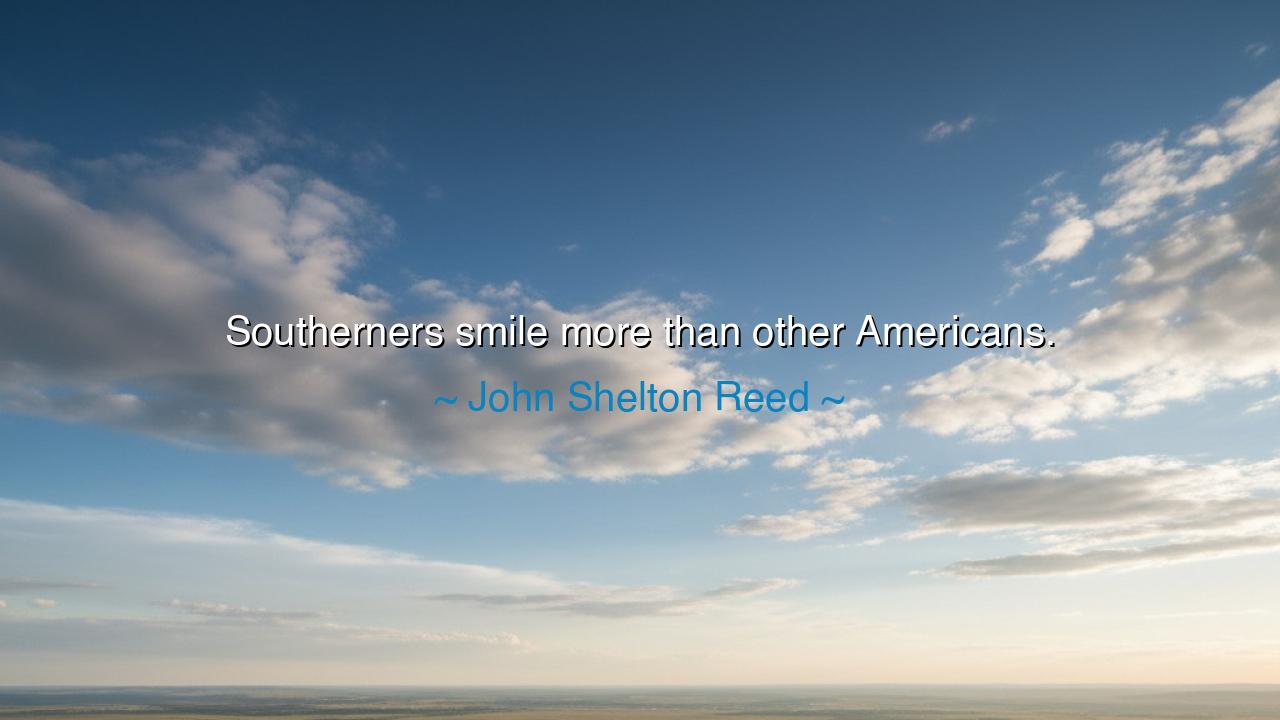
Southerners smile more than other Americans.






In the wisdom of ages past, the sages taught that a people can be known not merely by the weapons they wield or the wealth they hoard, but by the countenance they wear before strangers and kin alike. It is in this light that the words of John Shelton Reed resound: “Southerners smile more than other Americans.” These words, at once simple and profound, point us to a truth both cultural and eternal—that the outward expression of the face is the mirror of the inward spirit. To smile often is no small thing; it is the revelation of a heart inclined toward warmth, toward welcome, and toward fellowship.
The smile, as Reed observed among the children of the South, was not a trivial gesture, nor the shallow curve of lips for convenience’ sake. It was a symbol of survival, a tradition born of hardship. The South, scarred by the trials of war, poverty, and division, found in the smile a weapon stronger than steel, a salve gentler than balm. Where resources were scarce and the land demanded toil, people learned to weave joy into the fabric of daily life. Thus, to smile often was not to deny sorrow, but to proclaim victory over it.
Consider, then, the tale of a small town in Mississippi after the Great Depression. The soil was poor, the harvests thin, and men’s pockets turned empty. Yet when a stranger came upon the porch of a humble home, he was met not with suspicion but with laughter, not with silence but with welcome. The mother of that household, though her cupboard was bare, offered cornbread with open hands and a smile that spoke more richly than gold. That gesture was remembered long after the bread was eaten, for it proclaimed: “We may lack much, but we are not poor in spirit.” In such stories, the South carved its reputation for warmth, and Reed’s words found their foundation.
Yet, we must see that this heritage of smiling was more than custom—it was strategy. In a land where history had wounded deeply, smiles became a balm to bridge divides, to ease mistrust, to soften the sharp edges of pride. The Southern smile was diplomacy and grace; it was the silent promise that neighborliness could triumph over estrangement. In this, it stood as a bulwark against the cynicism of the age, proving that a gracious countenance could hold power equal to armies.
And what lesson lies within this for us, children of a later day? It is that the smile is a form of courage. To smile in the face of hardship is not naivety—it is defiance. To smile at a stranger is not weakness—it is generosity. In our crowded cities, where eyes grow cold and hearts close inward, the South’s teaching comes as a call: that warmth is not wasted, that hospitality is a legacy worth carrying forward. Reed’s observation is more than a cultural note; it is a challenge to every soul.
So let us take this teaching into our own lives. When you step into the marketplace, when you walk the halls of your labor, when you pass the weary traveler on the street—let your face bear the light of kindness. Offer a smile, not as an empty mask, but as a true gift. In time, you shall find that your own heart is lifted by it, and that others are drawn closer, as wanderers to a fire. For a community is not built by walls of stone, but by the invisible bonds of fellowship—and every smile strengthens those bonds.
The ancients would remind us: “A man may give silver and it will tarnish, he may grant land and it may wither, but the gift of gladness endures.” So, in the spirit of the South, as Reed bore witness, smile often, and smile truly. Let your countenance become a light in darkened places, and you will discover that the world itself bends gently toward you. This is no small inheritance, but a mighty treasure, carried not in the hand, but in the face.






AAdministratorAdministrator
Welcome, honored guests. Please leave a comment, we will respond soon